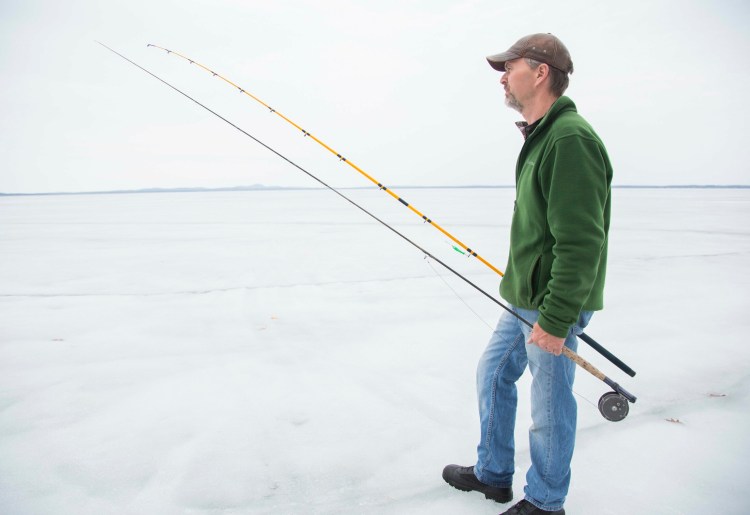SEBAGO — When dozens of fishermen line the mouth of the Songo River on Monday to mark the start of the fishing season, conversations between casts are sure to turn to the abundance of huge togue that were pulled from ice-fishing holes on Sebago Lake this winter and their hopes that there will be more to catch when the ice clears from the big bay this spring.

Ed Thompson of Hiram holds up his 39-inch togue caught on March 4, 2019. It weighed 21.5 pounds and was one of 11 togue over 15 pounds caught in Sebago during a five-week stretch. Courtesy of Ed Thompson
“It’s been crazy,” said Greg Cutting, the manager of Jordan’s Store, a weigh station on the western shore of Sebago Lake, where 11 lake trout over 15 pounds were recorded over the past month, creating a buzz among customers who come in and see photos of them.
With the amount of ice that remains in the open waters of southern and central Maine, it will still be a while until there’s a full changeover in fishing seasons. In the state’s 12 southernmost counties, where year-round fishing of any kind has been allowed since 2010, the former official opening day on April 1 is only ceremonial anyway, though it can still draw crowds to spots where trout and salmon have been known to be caught in early spring.
But because of the conditions this year, state biologists instead recommend many of the rivers and streams that are stocked or benefit from lakes where stocked fish drop down into the streams, such as the Presumpscot River in Standish, the Mousam River in Kennebunk and Cobbosseecontee Stream near Gardiner. The Songo River at the north end of Sebago is a perennial favorite on opening day.
Scott Davis, an assistant state biologist in Sidney, said there remains as much as 33 inches of ice on waters in central Maine. “A lot of us are still ice-fishing,” he said.
And many still have their winter catches on their minds.

Jim Goodale of Standish holds the 15.28-pound togue he caught on Sebago Lake on March 2, 2019. Photo courtesy of Greg Cutting
After the big bay on Sebago froze with a solid layer of ice for the first time in four years this winter, a veritable fishing frenzy began. Of the 11 unusually large togue brought in to Jordan’s Store, four were more than 20 pounds and all were longer than 3 feet.
A few factors are responsible for the abundance of big fish, said state fisheries biologist Jim Pellerin. Primary, Pellerin said, is the fishing regulation enacted in 2012 requiring togue between 23 and 33 inches to be thrown back. As a result, many of the bigger togue in the lake have been preserved and allowed to grow.
In addition, he said, the decline in the bait-fish populations in the last year would have resulted in less forage for the togue, possibly making them easier to catch. And the fact the big bay on Sebago did not freeze the past three years certainly would have played a role, Pellerin said, turning what already was the lake’s best togue habitat into a “honey hole” of big fish.
Not all fishermen have their big fish weighed, but many do in order to enter the state’s big-fish club, called The One That Didn’t Get Away. Fishermen must send an application from a weigh station to The Maine Sportsman magazine, which oversees the club. To get in the club with a big togue, the fish must weigh at least 15 pounds. Those that came into Jordan’s Store to weigh a big togue this winter were shocked and amazed at the size of their ranks.
Jim Goodale of Standish was particularly pleased. On Feb. 27, he landed a 17.06-pounder, then three days later, he caught a second that filled up his arms and weighed 15.28 pounds.
“This has been incredible. I’ve never seen anything like this in such a short time,” Goodale said. “With the second fish, when I caught it, I saw a fish that was even bigger than the one on the line.”
Ed Thompson of Hiram said the 21.5-pound, 39-inch togue he landed on March 4 on Sebago was the catch of a lifetime.

Fisherman Lance Sistare of Pomfret, Connecticut, holds his 16.48-pound togue that he caught in Sebago Lake on March 12. The togue was 37-1/4 inches long. Photo courtesy of Greg Cutting
“I’ve never caught a freshwater fish like that. And I’ve lived in the Sebago region my whole life,” said Thompson, 69.
The frenzy even drew Lance Sistare, a star on the cable TV show “Wicked Tuna,” from his home in Connecticut for a trip to Sebago with a fishing buddy in early March. It led to two more by himself, on the second of which he landed a 16.48-pounder that was 37 1/4 inches long. He plans to have it mounted and given to Jordan’s Store.
“I’ve ice-fished all over the Northeast. And if that big part of the lake, I estimate it to be about 15,000 acres, freezes next year, it’s going to be mobbed up there because of all this,” Sistare said.
Fishermen stopping in the store now are still talking about the past month full of big fish, Cutting said. And some no doubt wonder what it could mean for the months ahead.
“I don’t know if it will continue,” Goodale said. “It will be interesting to see. I still think there are big fish there. I’ve got my spot I’m going to try. It’s exciting. It’s good for fishing. People love the idea that you can catch a monster fish.”
Deirdre Fleming can be contacted at 791-6452 or at:
dfleming@pressherald.com
Twitter: FlemingPph
Correction: This story was updated at 8:50 a.m. Wednesday, April 3, 2019, to correct the year in which the the smelt population in Sebago Lake declined.
Send questions/comments to the editors.



